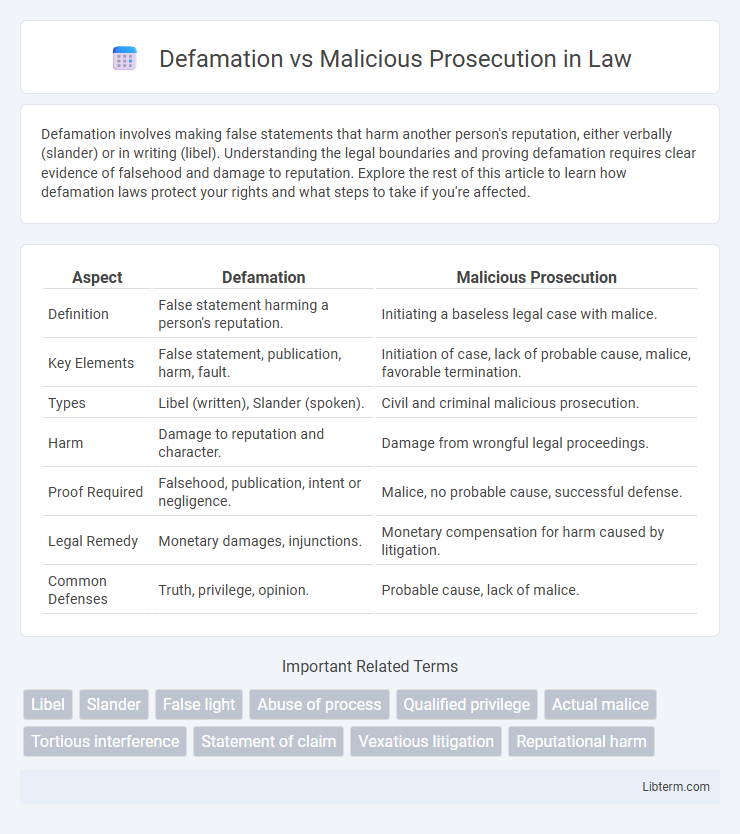Defamation involves making false statements that harm another person's reputation, either verbally (slander) or in writing (libel). Understanding the legal boundaries and proving defamation requires clear evidence of falsehood and damage to reputation. Explore the rest of this article to learn how defamation laws protect your rights and what steps to take if you're affected.
Table of Comparison
| Aspect | Defamation | Malicious Prosecution |
|---|---|---|
| Definition | False statement harming a person's reputation. | Initiating a baseless legal case with malice. |
| Key Elements | False statement, publication, harm, fault. | Initiation of case, lack of probable cause, malice, favorable termination. |
| Types | Libel (written), Slander (spoken). | Civil and criminal malicious prosecution. |
| Harm | Damage to reputation and character. | Damage from wrongful legal proceedings. |
| Proof Required | Falsehood, publication, intent or negligence. | Malice, no probable cause, successful defense. |
| Legal Remedy | Monetary damages, injunctions. | Monetary compensation for harm caused by litigation. |
| Common Defenses | Truth, privilege, opinion. | Probable cause, lack of malice. |
Introduction to Defamation and Malicious Prosecution
Defamation involves making false statements that harm another person's reputation, either through spoken words (slander) or written communication (libel). Malicious prosecution occurs when someone initiates a legal action with intentional wrongdoing or without probable cause, causing harm to the defendant. Both legal concepts protect individuals from wrongful harm but address different types of misconduct--reputational damage versus abusive legal proceedings.
Legal Definitions: Defamation vs Malicious Prosecution
Defamation involves false statements communicated to a third party that damage a person's reputation, typically classified as libel (written) or slander (spoken). Malicious prosecution refers to the wrongful initiation of legal proceedings against someone without probable cause, driven by malice or improper motives. Both torts protect distinct interests: defamation safeguards reputation, while malicious prosecution protects individuals from abuse of the judicial process.
Key Elements of Defamation
Defamation requires a false statement presented as fact that damages the reputation of an individual or entity, communicated to a third party with negligence or intent. Key elements include the publication of the statement, identification of the plaintiff, falsity, and resulting harm to reputation. Proof of actual malice is necessary in cases involving public figures to establish liability.
Key Elements of Malicious Prosecution
Malicious prosecution requires proving the original case was initiated without probable cause and with malice, resulting in a favorable termination for the defendant. Key elements include the defendant's wrongful initiation of legal proceedings, absence of valid grounds, malicious intent behind the lawsuit, and damages suffered by the plaintiff due to the baseless prosecution. Unlike defamation, which centers on false statements harming reputation, malicious prosecution focuses on the improper use of the legal system itself.
Differences in Legal Proceedings
Defamation involves false statements that harm a person's reputation, requiring proof of published or communicated falsehoods to a third party. Malicious prosecution pertains to wrongful initiation of legal proceedings without probable cause, demanding evidence of improper motive and favorable termination of the prior case. Legal proceedings differ as defamation cases center on reputational damage and communication, while malicious prosecution cases focus on abuse of judicial process and prior case outcomes.
Burden of Proof: Defamation vs Malicious Prosecution
In defamation cases, the burden of proof primarily rests on the plaintiff, who must establish that the defendant made a false statement presented as fact, causing harm to the plaintiff's reputation. In malicious prosecution claims, the plaintiff must prove that the original case was initiated without probable cause and with malice, and that it terminated in the plaintiff's favor. Both claims require the plaintiff to demonstrate harm, but malicious prosecution demands a higher burden through proof of improper motive and legal baselessness of the prior proceeding.
Types of Damages Awarded
Defamation cases commonly award damages such as compensatory damages for harm to reputation, emotional distress, and sometimes punitive damages to punish egregious false statements. Malicious prosecution claims typically involve damages for legal expenses, lost income, emotional suffering, and in some instances, punitive damages for malicious or reckless prosecution. Both torts emphasize compensatory and punitive damages, but malicious prosecution uniquely focuses on recovery for wrongful legal action costs and its broader impact on the plaintiff's life.
Common Defenses in Both Claims
Common defenses in defamation and malicious prosecution claims include the truth as an absolute defense, since proving the statement or allegation is factual negates liability. Privilege, whether absolute in judicial or legislative contexts or qualified in reports and fair comments, also protects defendants from liability. Furthermore, lack of malice or improper purpose plays a crucial role, especially in malicious prosecution, where the plaintiff must show the defendant acted with malice and without probable cause.
Real-Life Case Studies
Defamation involves false statements that harm a person's reputation, as seen in the famous New York Times Co. v. Sullivan case, where public officials must prove actual malice to win. Malicious prosecution requires proving that legal action was initiated without probable cause and with malintent, exemplified by the Barrymore v. Jenkins case where the plaintiff successfully showed abuse of process. Understanding these distinctions is crucial in navigating lawsuits where reputational damage and misuse of legal proceedings overlap.
Conclusion: Understanding the Distinctions
Defamation involves false statements that harm an individual's reputation, whereas malicious prosecution centers on initiating baseless legal action with malicious intent. Recognizing these distinctions is essential for accurately assessing legal claims and protecting personal rights. Clear differentiation aids in selecting the appropriate legal remedy and understanding the implications of each tort.
Defamation Infographic

 libterm.com
libterm.com